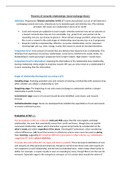Theories of romantic relationships: Social exchange theory
Definition: Proposed by Thibault and Kelley (1959) SET claims that partners act out of self interest in
exchanging rewards and costs, whereby we try to maximise gain and minimise loss (The minimax
principle). We assess our relationship in terms of its ‘profit’.
Costs and rewards are subjective to each couple, whereby someone may see an outcome as
a reward, someone else may see it as unvaluable. E.g., praise from your partner can be
rewarding, but you can choose to ignore it. These will also change overtime, what may seem
like a cost or reward in the early stages of relationships may become less so as it progresses.
Rewards could be companionship, affection, sex praise. Relationships can be ‘expensive’
meaning high cost e.g., time, energy, money that means It cannot be invested elsewhere.
Comparison level: Is the amount of reward that one believes they deserve from a relationship. This
develops from experience of previous relationships, social norms (reinforced in media, books, tv).
Relationships is worth pursuing if comparison level is high= esteem. High esteem = worth more!
Comparison level for alternatives: Assessing the alternatives to the relationship (new relationship,
leaving relationship, being single) to maximise reward. SET says we only remain in a relationship if it
is more rewarding than the alternatives.
Stages of relationship development (according to SET):
Sampling stage: Analysing potential costs and rewards of entering a relationship with someone (may
affect whether you initiate a relationship or not)
Bargaining stage: The beginning of cost and reward exchange to understand whether a deeper
relationship Is worth forming
Commitment stage: source of cost and reward become identified, costs lessen, and rewards
increase
Institutionalisation stage: Norms are developed that establish the expectations of cost and reward,
to ensure continued success.
Evaluation of SET +/-
The assumptions of SET are criticised. Clark and Mills argue that this only explains exchange
relationships, the ones that consistently assess their ‘profit and losses, though does not explain
communal relationships, one in which interaction is governed primarily by consideration of the
other’s needs and wishes regardless of the return. (Developed) Furthermore, when considering
cultural differences, Lott found that women in collectivist cultures were more focussed on giving
than receiving, suggesting SET would be difficult to generalise to other cultures e.g., individualist,
suggesting SET holds cultural relativism.
Concepts discussed within SET are vague and hard to quantify. This is because its definitions of cost
and rewards are often general and imprecise, though in real life terms these costs and rewards are
very subjective to each relationship, and will vary on individual basis’, which makes them harder to
define. For example, a couple’s loyalty is seen as rewarding by many, though fthis is not the case for
everyone. Especially vague is the comparison concepts, as it is unclear what exactly the values of





